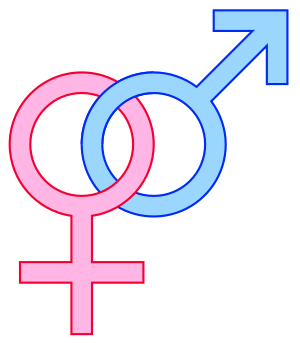Gender facts for kids
Gender is a word that helps us describe different types of people. It is often used to talk about whether someone is male or female. Sometimes, people use "gender" instead of "sex" because the word "sex" can have many other meanings, which can be confusing.
Contents
Understanding Gender
The word "gender" has changed its meaning over time. Before the 1950s, it was mainly used in grammar. Later, scientists started using it to describe people in a new way.
Gender in Grammar
For a long time, "gender" was only used when talking about words. In languages like Spanish, French, and Italian, many words are either "masculine" or "feminine." For example, in Spanish, the word for 'house' (casa) is feminine. The word for 'day' (día) is masculine. Some languages, like German, even have three genders for words.
Back then, if you wanted to say someone was male or female, you would use the word sex. The word "gender" was not used for people at all.
Gender in Social Science
In 1955, a scientist named John Money started using the word "gender" in a new way. He was studying how men and women are similar and different. He created the term gender role to describe how people act. This was different from just talking about their bodies.
In social sciences, which study how people behave in groups, there is a clear difference between 'sex' and 'gender':
- The word 'sex' usually describes a person's body. This includes things like sex organs and sex chromosomes, which show if someone is biologically male or female.
- The word 'gender' describes how someone feels or acts. It can mean if someone feels or acts more like a female (which is called feminine) or more like a male (which is called masculine).
Related pages
Images for kids
-
Mary Frith ("Moll Cutpurse") surprised people in the 1600s by wearing men's clothes and smoking. She did not follow the usual gender roles for women.
-
"Rosie the Riveter" was a famous symbol during World War II. She showed women working in factories, which was a big change from traditional "feminine" roles because of the war.
-
During a difficult time in Spain, Agustina de Aragón became the only female professional officer in the Spanish Army. She broke traditional gender barriers.
See also
 In Spanish: Género (ciencias sociales) para niños
In Spanish: Género (ciencias sociales) para niños
 | May Edward Chinn |
 | Rebecca Cole |
 | Alexa Canady |
 | Dorothy Lavinia Brown |







